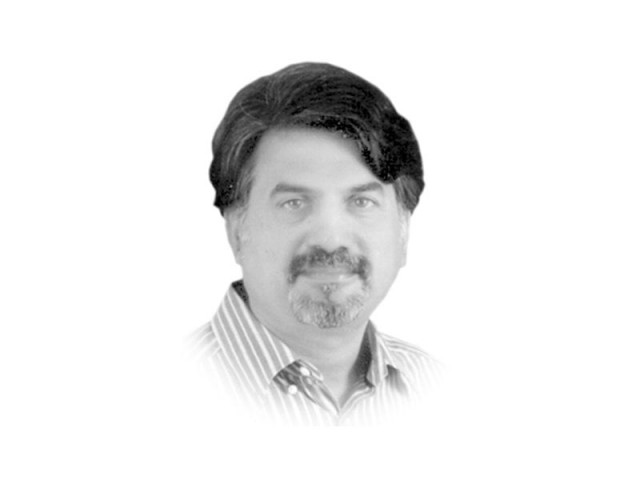The race for exit?
As leaders of PPP and PML-N face corruption charges

The writer is a member of faculty of contemporary studies at NDU Islamabad and can be reached at muhammadaliehsan1@hotmail.com
Politics is all about creating and nurturing a political environment in which political ideas can be built and sold. Unfortunately for both the mainstream parties — no matter which kind of political idea they may develop, deploy and employ — it may not be as appealing and alluring as it would have been in the past. The reason is the changed political environment in this country in which challenging the arrests of the leaders would mean challenging the ‘decisions of an independent judiciary’. Sadly for the leadership of these parties, all roads to political redemption will now have to pass through the judiciary, and opposing, threatening and confronting the judiciary — maybe terming it biased and not independent under the current political environment — would be a suicidal political strategy. So what political swords, sabers, bows and arrows are these parties going to lay their hands on to combat a political duel which in the past they have been winning with one hand tied at the back but today seem almost unwinnable? Go to the people’s court is the political trumpet being sounded and heard. But ‘bees swarm as long as the Queen is there’. With both the leaders arrested, would the second-tier leadership be able to deliver?
The ‘political convergence’ that the challenges of arrests demands is also something that may never transform overnight a ‘political crowd’ into an ‘orderly group’ that is ‘ideologically woven together’ to deliver on the streets. Not very long ago both the parties were at each other’s ‘political throats’ so it is highly unlikely that the political and ideological differences between them can disappear suddenly. Even if they do, the disappearance will be over-surface, the sub-surface differences which actually make any movement politically sustainable are not easy to bridge even if there is this commonality of political interest.
Fast fading into insignificance in the political environment of this country is also the politics of patronage and individual preferences. A first of its kind in our political history — today the political patrons who were the ‘stick holders’ and the ‘carrot givers’ stand accused of corruption — a political title that only a ‘victim detergent’ can wash away and politically vindicate. So preferably, the entire political strategy of the two political parties will be built around the concept of ‘political victimisation’. All methods to execute this policy will be based on this concept of political convergence. One such method has already been executed by reaching out to the Election Commission to find out the declaration of assets of Prime Minister Imran Khan and his political knights. This component of the strategy also seems self-defeating as it seeks to damage the standing of a political competitor but does nothing directly to address the accusations of corruption that stains their political leadership. The hold on power is slipping from the hands of the conductors of the ‘politics of monarchy’. Those standing astride and besides them for years (some of them are referred to as political gurus) in our country are most likely to have their own politics undermined in their constituencies — given there are solid judicial verdicts based on sound evidences that punishe and jail their leadership. If these so-called political stalwarts who have witnessed political ascent tied to their political parties don’t take a moral stand and keep brow-beating and feeding a ‘non-saleable’, ‘pro-party defending sidelined leadership’ political narrative to their constituencies than in time they are also likely to overtime become ‘political punching bags’ the punchers of which will be the ‘victimised’, ‘corruption-deprived’ people of their constituencies.
The most important and most deserving political narrative that this country looks up to from politics is the narrative of giving up on ‘defining narrowly the political individual and party interests’ and instead of exploiting each other’s weaknesses and vulnerabilities, stand up, engage and compete fiercely for what is good for this country. Any political strategy that the political parties employ should be the ‘strategies of responsible political competition’. Pakistan’s long-term political interests can only be served under such a strategic political setting of responsible completion executed under a transparent political environment devoid of a political model in which power is jealously held and guarded by few and political inclusion , empowerment and respect is doled out to only a minority.
In the fast-changing political environment in this country, the most powerful political instrument will no more be ‘ideologically divergent political convergence’ — the likes of ‘Murree Declaration’. It will not be even ‘push-back of one institution against the other to grab more space for power’, it will be the political idea that talks about tackling common challenges faced by the country, it will be uniting under the common goal of stopping all the enemies of Pakistan in their tracks. Indulging in corruption is one such enemy and a political redline that will no more be safe to cross.
The future does not belong to those who will make choices that will be in conflict with the idea of safe, prospering and forward-looking Pakistan. They are most likely to be politically sidelined.
Published in The Express Tribune, December 23rd, 2018.
Like Opinion & Editorial on Facebook, follow @ETOpEd on Twitter to receive all updates on all our daily pieces.















COMMENTS
Comments are moderated and generally will be posted if they are on-topic and not abusive.
For more information, please see our Comments FAQ